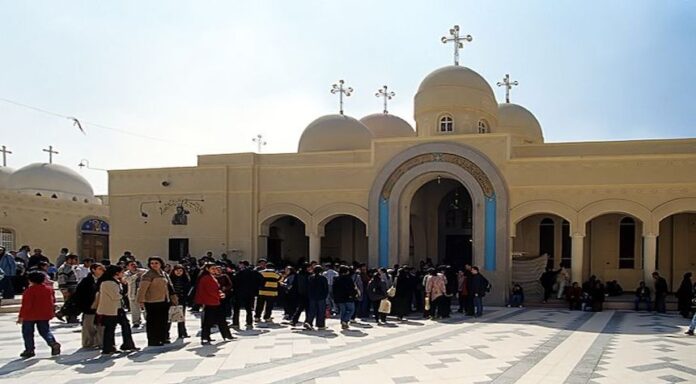Last week, five to six Coptic churches in Egypt caught fire. The worst incident occurred Sunday, August 14, 2022, at the Church of Abu Seifein, which is named after Saint Mercurius of Caesarea who is highly revered by Copts. At least 41 Christians, 18 of them children, were killed in the stampede, to asphyxiation, or burning alive. Five-year-old triplets, their grandmother, aunt, and the officiating priest were also among those who were killed.
It is hard to believe that Muslims have bombed or torched hundreds of Coptic churches in Egypt over the years. This is despite the fact that many churches are full. This week also marked the “anniversary,” when Muslim Brotherhood sympathizers set fire to 62 Coptic churches in Egypt. It is possible that these same elements were “commemorating” those events by setting fire to more Christians.
However, Egyptian officials and Western media quickly attributed the fire to “faulty electrical wiring”, which killed 41 Christians. This explanation, however, is suspect, if only because it was presented literally minutes after the fire broke. And, as many observers know, it takes serious and prolonged investigations before such a determination is made.
This reminds us of the Paris attack on Notre Dame Cathedral, France. A nation that, like Egypt, has seen many attacks on churches. It was discovered that two churches were attacked on an average per day in France, a country with one of the largest Muslim populations in Europe, in the days preceding the Notre Dame fire. Some had human fecal matter smeared all over them, a common “stunt,” in the Muslim world. As with the Church of Abu Seifein’s burning, Notre Dame was torched immediately without any serious investigation.
It doesn’t matter if the fire was caused by faulty electrical wiring, but the government of Egypt is still to blame. Strict restrictions based on sharia have made it nearly impossible for Christians to not only build but also repair churches since Ottoman times. A 2016 law was proclaimed to have lifted these strict restrictions, but practically speaking, many Copts are still not satisfied. Many Coptic churches in Egypt, including those of Copts, are poorly built, cramped, and poorly wired.
The New York Times reported that the Copts had long complained of being discriminated against because of their faith. Government restrictions on building, renovating, and repairing churches in this predominantly Muslim country are one example of this discrimination. Many of these buildings are now in disrepair, making them fire hazards.
More churches were set on fire and more Christians were killed. It doesn’t matter how you look at it, whether Muslims are “radicalized”, or whether churches are restricted, dilapidated buildings and faulty wiring are to blame, the Egyptian government and leadership are ultimately responsible.




